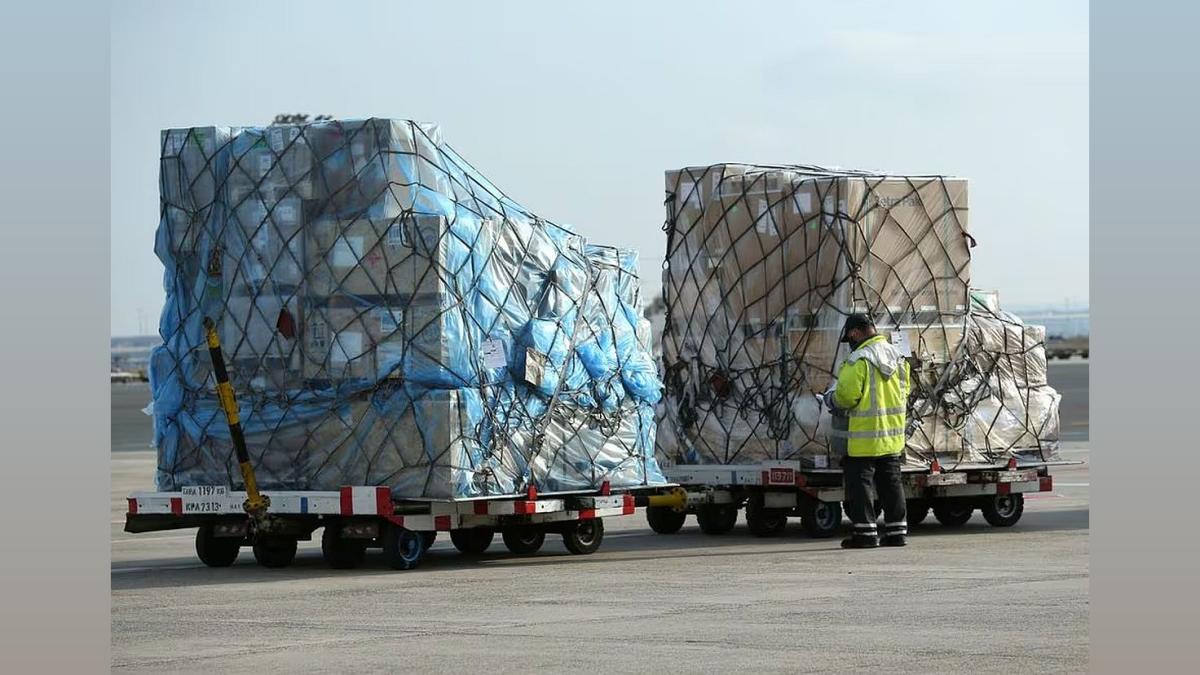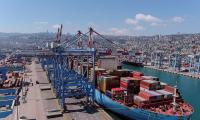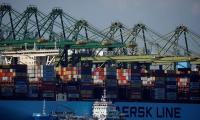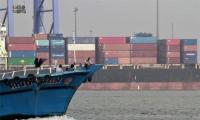Container Volume to Grow 8% to 342 Million Tonnes in FY25: Report
Container volume in India is expected to grow 8% to 342 million tonnes in FY25, driven by capacity additions and the dedicated freight corridor. Coal cargo is also expected to grow.

Photograph: Ralph Orlowski/Reuters
Mumbai, May 16 (PTI) Container volume is expected to grow by 8 per cent to 342 million tonnes this fiscal despite the risk of a prolonged Red Sea crisis, CateEdge Ratings said on Thursday.
The slated connection of the dedicated freight corridor to Jawaharlal Nehru Port in FY26, along with capacity additions by ports, is expected to drive growth in container volume over the medium term, it added.
Cargo at Indian ports is dominated by 3Cs -- crude oil (termed as Petroleum Oil Lubricants (POL), coal and containers.
These three commodities represent 74-75 per cent of total cargo throughput handled by ports.
Over the past 3 years ended FY24, POL witnessed a moderate CAGR of 4 per cent while coal and container volumes witnessed 13 per cent and 9 per cent growth, respectively, CateEdge Ratings said.
The rating agency said it expects coal cargo throughput at ports to grow at a CAGR of 2-3 per cent between FY24 and FY26, despite an anticipated decline in coal imports by 3-4 per cent due to increased domestic coal production.
The share of coastal cargo is expected to rise from 34 per cent in FY23 to 42 per cent by FY26, as per CareEdge Ratings report.
"This growth will primarily be driven by the coastal movement of coal along the eastern coast, complemented by added capacities and synergistic benefits. The Government's focus on building agglomeration infrastructure for specific sectors like steel and cement also supports the expected increase in coastal movements at ports," said CareEdge Ratings Director Maulesh Desai.
The coal throughput witnessed healthy growth from 292 MMT in FY22 to 367 MMT in FY23. The growth in throughput was supported by increased power generation from thermal plants by 6 per cent to 1,059.9 billion units, according to CareEdge Ratings.
Against this, it said, the imported coal volume registered a year-on-year growth of 14 per cent to 241 MMT in FY23.
However, the volume growth was largely driven by increased coastal volumes of coal, it said, adding that coastal volumes have grown from 80 MMT in FY22 to 126 MMT in FY23, registering strong growth of 57 per cent.
During FY24, the year-on-year growth in coal throughput was around 9 per cent, equivalent to the increase in thermal power generation of 9 per cent, aided by the increase in domestic coal production and continued coastal coal volumes on a high base of FY23, CareEdge Ratings said.
Coastal throughput is expected to increase from 60 MMT in FY21 to 145-150 MMT in FY24, reflecting a healthy CAGR of around 35 per cent, as per the rating agency.
The same was largely driven by an increase in cargo movement on the eastern coast with the ramp-up of overall volumes at Paradip, Gangavaram, Krishnapatnam, Dhamra and Gopalpur ports, it added.
Contribution of coal cargo of the overall coastal volumes is estimated to increase from 22 per cent in FY21 to 38 per cent in FY24, it added.
"The Red Sea crisis has led to an increase in voyage span by 15-20 days, in addition to higher freight rates. However, the capacity liners' readiness to expand container capacity'? owing to healthy profitability by chartering additional vessels, cascading capacity from other regions, and accelerating fleet renewal ?bodes well for mitigating the increased transit times," Desai said.
The impact on cargo, according to him, will primarily affect food grains and other perishable items, along with freight-sensitive or low-value cargo, which is estimated at 10-15 per cent of container volumes.
India relies on the Suez Canal route for its trade with European countries, North Africa, and the Americas, which collectively account for about 35 per cent of the country's total foreign trade, primarily in the container segment.
However, the impact on cargo will primarily affect food grains and other perishable items, along with freight-sensitive or low-value cargo, which together constitute 10-15 per cent of the total volumes, CateEdge said.
India's maritime sector is represented by the 12 major ports and more than 200 non-major ports along the 7,500 km of coastal line.
The slated connection of the dedicated freight corridor to Jawaharlal Nehru Port in FY26, along with capacity additions by ports, is expected to drive growth in container volume over the medium term, it added.
Cargo at Indian ports is dominated by 3Cs -- crude oil (termed as Petroleum Oil Lubricants (POL), coal and containers.
These three commodities represent 74-75 per cent of total cargo throughput handled by ports.
Over the past 3 years ended FY24, POL witnessed a moderate CAGR of 4 per cent while coal and container volumes witnessed 13 per cent and 9 per cent growth, respectively, CateEdge Ratings said.
The rating agency said it expects coal cargo throughput at ports to grow at a CAGR of 2-3 per cent between FY24 and FY26, despite an anticipated decline in coal imports by 3-4 per cent due to increased domestic coal production.
The share of coastal cargo is expected to rise from 34 per cent in FY23 to 42 per cent by FY26, as per CareEdge Ratings report.
"This growth will primarily be driven by the coastal movement of coal along the eastern coast, complemented by added capacities and synergistic benefits. The Government's focus on building agglomeration infrastructure for specific sectors like steel and cement also supports the expected increase in coastal movements at ports," said CareEdge Ratings Director Maulesh Desai.
The coal throughput witnessed healthy growth from 292 MMT in FY22 to 367 MMT in FY23. The growth in throughput was supported by increased power generation from thermal plants by 6 per cent to 1,059.9 billion units, according to CareEdge Ratings.
Against this, it said, the imported coal volume registered a year-on-year growth of 14 per cent to 241 MMT in FY23.
However, the volume growth was largely driven by increased coastal volumes of coal, it said, adding that coastal volumes have grown from 80 MMT in FY22 to 126 MMT in FY23, registering strong growth of 57 per cent.
During FY24, the year-on-year growth in coal throughput was around 9 per cent, equivalent to the increase in thermal power generation of 9 per cent, aided by the increase in domestic coal production and continued coastal coal volumes on a high base of FY23, CareEdge Ratings said.
Coastal throughput is expected to increase from 60 MMT in FY21 to 145-150 MMT in FY24, reflecting a healthy CAGR of around 35 per cent, as per the rating agency.
The same was largely driven by an increase in cargo movement on the eastern coast with the ramp-up of overall volumes at Paradip, Gangavaram, Krishnapatnam, Dhamra and Gopalpur ports, it added.
Contribution of coal cargo of the overall coastal volumes is estimated to increase from 22 per cent in FY21 to 38 per cent in FY24, it added.
"The Red Sea crisis has led to an increase in voyage span by 15-20 days, in addition to higher freight rates. However, the capacity liners' readiness to expand container capacity'? owing to healthy profitability by chartering additional vessels, cascading capacity from other regions, and accelerating fleet renewal ?bodes well for mitigating the increased transit times," Desai said.
The impact on cargo, according to him, will primarily affect food grains and other perishable items, along with freight-sensitive or low-value cargo, which is estimated at 10-15 per cent of container volumes.
India relies on the Suez Canal route for its trade with European countries, North Africa, and the Americas, which collectively account for about 35 per cent of the country's total foreign trade, primarily in the container segment.
However, the impact on cargo will primarily affect food grains and other perishable items, along with freight-sensitive or low-value cargo, which together constitute 10-15 per cent of the total volumes, CateEdge said.
India's maritime sector is represented by the 12 major ports and more than 200 non-major ports along the 7,500 km of coastal line.
You May Like To Read
TODAY'S MOST TRADED COMPANIES
- Company Name
- Price
- Volume
- Vodafone-Idea-L
- 11.65 (+ 3.56)
- 106772451
- Alstone-Textiles
- 0.28 ( -3.45)
- 44187760
- Mangalam-Industrial
- 0.88 ( -2.22)
- 39177573
- Sunshine-Capital
- 0.27 (+ 3.85)
- 35956340
- GMR-Airports
- 104.40 (+ 6.37)
- 30453005





